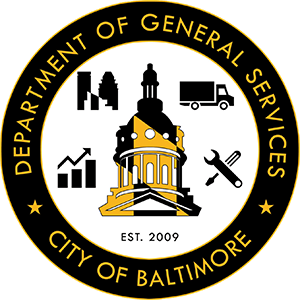

If You Build, They Will Come—Happier: A City Agency Embraces Cycling Infrastructure Expansion to Improve Work Environment and Morale and Find a $10m Commercial Property Tax Cut Along the Way
Written by Babila Lima
The Department of General Services (DGS) is located in the tall administrative building just North of City Hall. Most residents associate the place with the payment of water bills or parking tickets and filing for construction and street closure permits. It is a building named after Abel Wolman, one of the preeminent water and wastewater engineers in history and one of Baltimore’s great civic leaders.
Few residents, employees or visitors hear “Abel Wolman” and think “fun.” However, that is starting to change. After recognizing the changes in the Department’s workforce and the needs of new employees, recognizing the increasing numbers of bikers he would drive past during his morning commute and recognizing the increasing interest in biking to work or cycling events, DGS Director Steve Sharkey began to change the physical work space.
In 2013 General Services partnered with the Energy Office to identify space in the building for the establishment of a bike room. The Department cleared space in a large basement room and installed bike racks for the use of employees. Prior to the establishment of the bike room, the Department of General Services—also responsible for public space and sidewalks—worked with the Department of Transportation on installation of a public bike rack at the entrance of the Abel Wolman building for the visitors, bike messengers, tourists, employees and other residents that access the building by bicycle. The City’s Department of Transportation was an important partner in making the entrances to public facilities more bike friendly. In addition to physical changes inside and outside the building, the Department of General Services approved the purchase of two lightweight Brompton bicycles stored in the building for the use of employees to attend downtown meetings or for use on work breaks during nice weather. The cost for the above changes was minimal but, added together the impact on morale and on DGS’s ability to communicate its values to residents and employees was remarkable.

DGS Director Steve Sharkey, a Locust Point resident saw a bike on sale as the winter broke, purchased it and has been riding to work every day parking alongside 10—15 other employees in the bike room. DGS utility Aide Marcus Williams bikes in from West Baltimore and another employee, Mark Benson of the Energy Office bikes in from Homeland which is roughly 5 miles from Abel Wolman.
As the Department worked to expand cycling infrastructure DGS found that changes in the physical space helped focus efforts on positive policy changes both internally and externally. The changes in workspace and culture resulting from the expansion of bike infrastructure lead to discussions about how programs under the purview of DGS could improve the environment for residents and local businesses. Project Manager Babila Lima, also a biker, worked with the DGS Director to structure and negotiate a revision to the Minor Privilege fee schedule resulting in a reduction in property fees of $10 million over 10 years. The proposal that was approved by the Board of Estimates in January of 2015 eliminated the annual fees for the installation of bike racks to incentivize private businesses to assist in the expansion of bike infrastructure at restaurants, coffee shops and neighborhood businesses throughout the City.
DGS knows that initiatives like bike sharing programs and installation of bike rooms for employees improve morale and efficiency. The Department also knows that expanding bike infrastructure with appropriately placed bike lanes and bike racks can support the growth of Baltimore City and the health of local neighborhood businesses. Research in Portland Oregon found that as customers, cyclists spend more per month at local bars, restaurants and stores than automobile drivers. A study in neighboring D.C. that analyzed the impact of a dedicated bike sharing and parking system on local business found that businesses experienced an increase in customer traffic and positive impact on their sales.

As more millennials move downtown and start filtering into the workforce, they are looking increasingly for opportunities to use alternative forms of transportation. From the changes in employee morale, employee participation in bike events and in the expansion of bike infrastructure throughout the City at private establishments and at the entrances of the facilities managed by General Services, it is clear that, if you build it—they will come.